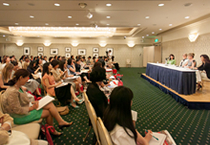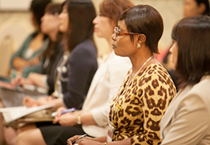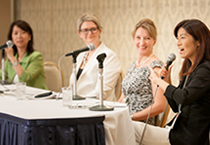Session 201
“What woman can do to move Japan forward”

Counsellor Public Affairs,
Australian Embassy in Tokyo

NHK World News Anchor

Executive Director,
British Chamber of Commerce
in Japan
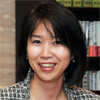
Executive Operating Officer &
Managing Editor
The Japan Times Ltd.
※ (F) refers to the facilitator.

Women’s issues are being talked about in Japan, but progress is slow. In this lively interactive discussion, the panelists shared their perspectives and discussed practices in other countries that could be used to bring substantial, significant change to Japan.
Sayuri Daimon, Executive Operating Officer and Managing Editor for the Japan Times, the largest English language daily newspaper in Japan, served as facilitator. After introducing herself, she introduced the other panelists: Dr. Alexandra Siddall, Counsellor of Public Affairs, Embassy of Australia in Tokyo; Lori Henderson, Executive Director of the British Chamber of Commerce in Japan; and Minori Takao, NHK World News anchor.
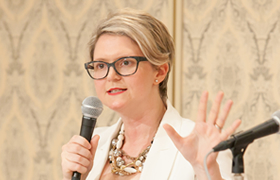
Dr. Alexandra Siddall
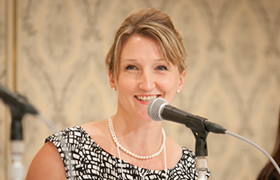
Ms. Lori Henderson
Dr. Siddall explained how, in Australia, the institutional and legislative frameworks have been in place for the last 20 years for non-discrimination and gender equality. Paid parental leave, flexible hours, and child care are usually available. But in reality, progress is slow in Australia too: there still aren't enough female CEOs and senior managers. Institutions are essential, but they aren't sufficient in themselves to effect real change, so Australia has entered the second stage of reform; changing people's attitudes and behaviors. An Australian government initiative called “Male Champions for Change,” in which 21 corporate and government leaders at the highest level have committed to diversity and equality in the workplace, is starting to show results. Some of Australia's top corporations and organizations are committing to broad company-wide change.
Ms. Henderson shared how the British government's “Opportunity Now” program makes the business case for diversity and for women in leadership; communication improves, diversity of ideas increases, and more innovation occurs.
As additional measures to take, Dr. Siddall stressed the importance of going abroad for study or work to broaden one's perspective. She also encouraged the audience to become involved in a mentoring system, as a mentor or a mentee.
Ms. Henderson warmed the audience with a story about Japanese research on monkeys in the 1950s; researchers observed how young monkeys would try new things that older monkeys would then copy. After 100 monkeys adopted the behavior, it spread to other islands almost simultaneously through collective consciousness. She encouraged the women at the Conference to be 100 women that create broad and significant change.
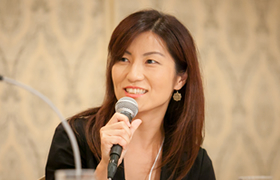
Ms. Minori Takao
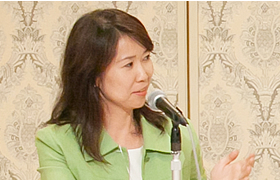
Ms. Sayuri Daimon
An audience member asked the panelist for advice to give to men. Ms. Henderson encouraged them to realize that “there is such a thing in the 21st century as work-life balance” and to not be afraid to leave the office in the evening. Ms. Daimon said she is noticing that young men in her office are starting to leave on time to attend to family duties and she considers it a positive trend.
A high school student was applauded when she asked “what role do you think the media can play in ameliorating the role of women in Japanese society?”
Ms. Daimon took the mike to explain how female reporters can have an impact. On 3/11, male reporters were sent to Fukushima first. It wasn't until female reporters arrived that the difficulties facing the female survivors made the news. Ms. Takao agreed, saying that women actually approached her, as a reporter, because they thought a woman would understand them better.
In response to a question about changing the mindset of women, Dr. Siddall talked about Australia’s foreign aid programs and how they are becoming more gender oriented now that their experience in micro-development shows that a dollar given to a woman gets a better outcome than a dollar given to a man. Women start small but their build their business overtime and they hire women, which reduces poverty.
Ms. Henderson closed by answering a question about the potential of social media campaigns to change perspectives on work. She explained that twenty years ago in the UK, it was OK to smoke in public, drive after drinking, to go without a seatbelt. Now, it is too painful; you pay a fine and lose your license.
So, if Japanese companies aren't taking the steps to promote diversity and gender equality, “fine them”,
she said, to much applause.
ayako7777 さん
メディアに携わる日本人バイリンガル女性2名と、政府系の外国人女性による円卓会議で、オーストラリアとイギリスの政府による女性活用の施策、日本の現状についての意見が交換されました。ロンドンオリンピックで、女性を活用していない企業は参加が許されなかったという話が最もインパクトを受けました。女性を大事にしている事実はPR的にもメリットがあるということにも納得し、消費決定権を持つことの多い女性が、消費者としても女性登用への各企業の態度を判断していく時代になっていくことを感じました。NHKでも国際部門にはパワフルな女性が多く雰囲気や意思決定も大きく異なるということも興味深いと思いましたが、質問にも上がったように、それでもメディアはステレオタイプを報道してしまうことが多いことを改めて認識しました。メディアには被害者としての女性ではなく、もっと力強い女性の姿や可能性を報道してほしいですし、ダイバーシティの観点のみでなく、女性が苦手とされてきた分野でも、専門性については女性男性関係なく、力を発揮できるどいうことを常識にしていくことに尽力してほしいものです。女性ならではの視点ということだけでなく、一人の個人としての意見として見られる時代へ、政府もメディアも尽力してほしいと強く思いました。
注)出演者の肩書きは開催当時のものです。




